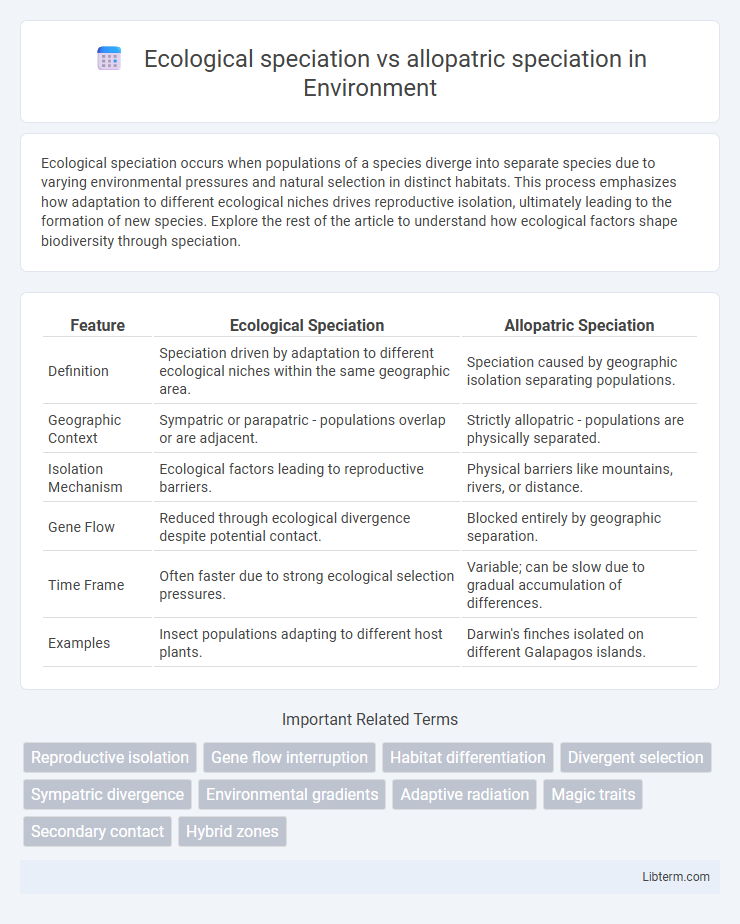Ecological speciation occurs when populations of a species diverge into separate species due to varying environmental pressures and natural selection in distinct habitats. This process emphasizes how adaptation to different ecological niches drives reproductive isolation, ultimately leading to the formation of new species. Explore the rest of the article to understand how ecological factors shape biodiversity through speciation.
Table of Comparison
| Feature | Ecological Speciation | Allopatric Speciation |
|---|---|---|
| Definition | Speciation driven by adaptation to different ecological niches within the same geographic area. | Speciation caused by geographic isolation separating populations. |
| Geographic Context | Sympatric or parapatric - populations overlap or are adjacent. | Strictly allopatric - populations are physically separated. |
| Isolation Mechanism | Ecological factors leading to reproductive barriers. | Physical barriers like mountains, rivers, or distance. |
| Gene Flow | Reduced through ecological divergence despite potential contact. | Blocked entirely by geographic separation. |
| Time Frame | Often faster due to strong ecological selection pressures. | Variable; can be slow due to gradual accumulation of differences. |
| Examples | Insect populations adapting to different host plants. | Darwin's finches isolated on different Galapagos islands. |
Introduction to Speciation
Ecological speciation occurs when reproductive isolation arises due to divergent natural selection driven by different environmental conditions, leading to the formation of new species within overlapping or adjacent habitats. In contrast, allopatric speciation involves geographic isolation where physical barriers like mountains or rivers prevent gene flow between populations, allowing genetic divergence over time. Both processes highlight fundamental mechanisms by which biodiversity increases through the formation of reproductively isolated populations.
Defining Ecological Speciation
Ecological speciation occurs when reproductive isolation evolves due to divergent natural selection arising from different ecological environments, leading to the emergence of new species. This contrasts with allopatric speciation, where geographic separation restricts gene flow between populations, allowing them to diverge genetically over time. The key feature of ecological speciation is the role of adaptation to distinct ecological niches driving reproductive barriers without requiring physical isolation.
Understanding Allopatric Speciation
Allopatric speciation occurs when geographic barriers divide populations, preventing gene flow and leading to genetic divergence over time. This form of speciation relies on physical isolation, causing populations to evolve independently due to mutation, natural selection, and genetic drift. Understanding allopatric speciation is fundamental to evolutionary biology, as it explains the formation of new species through geographic separation without ecological differentiation.
Key Mechanisms Driving Ecological Speciation
Ecological speciation is primarily driven by divergent natural selection arising from different environmental conditions, which leads to reproductive isolation between populations inhabiting distinct ecological niches. Key mechanisms include adaptation to varying habitats, resource use, and ecological interactions that promote genetic differentiation despite potential gene flow. In contrast, allopatric speciation relies on geographic isolation preventing gene flow, allowing genetic drift and selection to independently drive divergence without ecological differentiation being the primary factor.
Geographic Isolation in Allopatric Speciation
Geographic isolation plays a crucial role in allopatric speciation by physically separating populations, preventing gene flow, and allowing independent evolutionary trajectories. In contrast, ecological speciation often occurs without complete geographic barriers but involves divergent natural selection due to differing environmental conditions. The strict spatial separation in allopatric speciation creates clear genetic divergence driven primarily by geographic barriers such as mountains, rivers, or distance.
Comparative Genetic Divergence
Ecological speciation involves genetic divergence driven by adaptation to different environmental conditions within overlapping or adjacent populations, leading to reproductive isolation despite gene flow. In contrast, allopatric speciation occurs through geographic isolation, where physical barriers prevent gene flow, resulting in genetic divergence primarily due to drift and local adaptation. Comparative genetic analyses reveal that ecological speciation often shows genomic regions under strong divergent selection, whereas allopatric speciation exhibits more uniform genome-wide divergence patterns caused by genetic drift and limited migration.
Role of Natural Selection in Speciation
Natural selection drives ecological speciation by promoting reproductive isolation through adaptation to different environmental conditions, leading to divergence despite geographic overlap. In contrast, allopatric speciation primarily results from geographic barriers preventing gene flow, with natural selection further reinforcing divergence once populations are isolated. The role of natural selection is crucial in ecological speciation for directly shaping traits that influence survival and mating within distinct ecological niches.
Case Studies: Ecological vs. Allopatric Speciation
Ecological speciation is driven by divergent natural selection arising from different ecological niches, exemplified by cichlid fish in African lakes adapting to varying diets and habitats, leading to reproductive isolation without geographic barriers. Allopatric speciation occurs due to physical separation, as observed in Darwin's finches where geographic isolation on different Galapagos Islands caused genetic divergence and speciation. Comparative studies reveal ecological speciation often involves sympatric divergence based on niche specialization, while allopatric speciation hinges on geographic isolation followed by genetic drift and selection.
Implications for Biodiversity and Evolution
Ecological speciation drives biodiversity by promoting reproductive isolation through adaptation to different environmental niches, accelerating evolutionary divergence even in the presence of gene flow. Allopatric speciation increases biodiversity by geographic isolation, allowing populations to accumulate genetic differences without interbreeding, often resulting in distinct species over time. Understanding these mechanisms provides insight into evolutionary dynamics and highlights the role of both environmental factors and geographic barriers in shaping species diversity.
Future Directions in Speciation Research
Future directions in speciation research emphasize integrating genomic tools to unravel the genetic basis of ecological speciation and allopatric speciation, enhancing understanding of adaptive divergence and reproductive isolation mechanisms. Advances in environmental DNA (eDNA) sampling and landscape genomics provide novel insights into how ecological variables and geographic barriers shape speciation processes in natural populations. Interdisciplinary approaches combining ecology, genomics, and phenotypic analysis will illuminate the dynamic interactions driving speciation across varying spatial and temporal scales.
Ecological speciation Infographic

 libterm.com
libterm.com